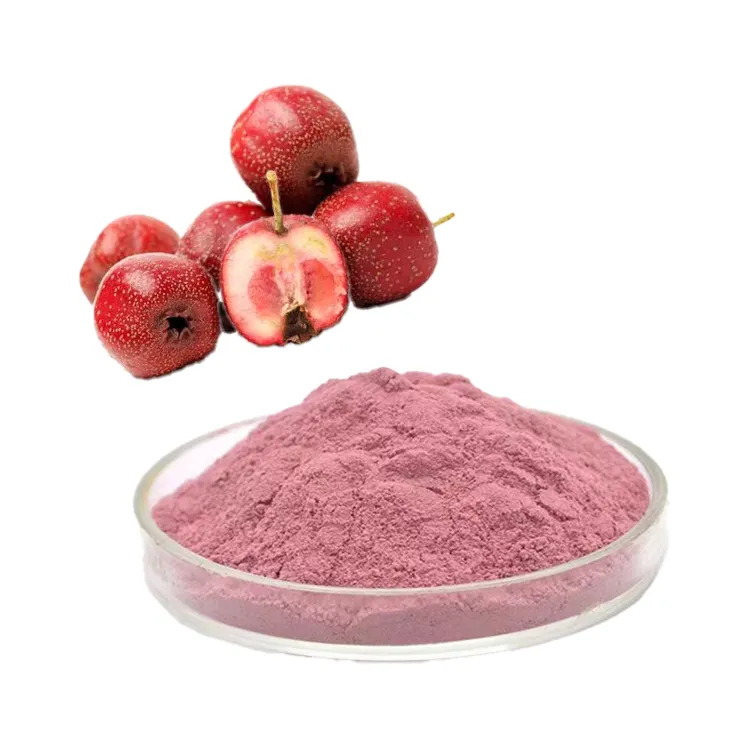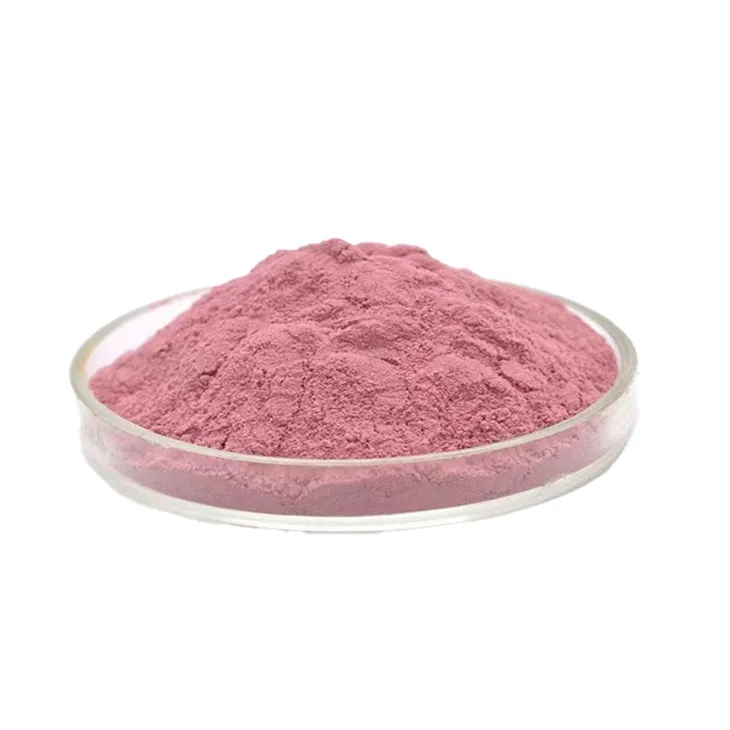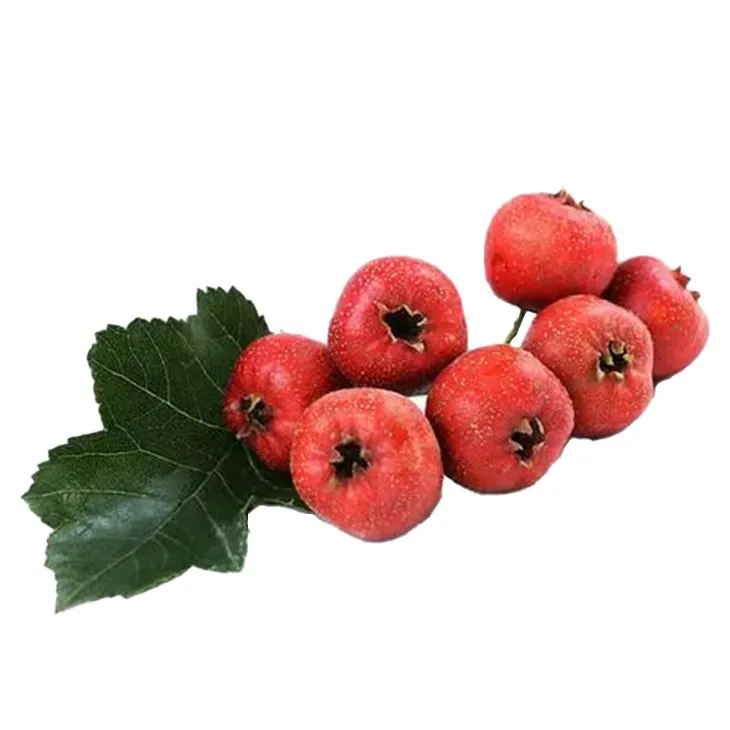- 0086-571-85302990
- sales@greenskybio.com
Benefits of Hawthorn Powder in Cattle Feed.
2024-11-12

Nutritional Value of Hawthorn powder
Hawthorn powder is a valuable addition to cattle feed due to its rich nutritional profile. It contains a variety of vitamins, such as vitamin C, which is essential for the overall health of cattle. Vitamin C plays a crucial role in collagen synthesis, which is important for maintaining the integrity of tissues in the body of cattle. This includes the connective tissues in the muscles, joints, and blood vessels.
In addition to vitamins, Hawthorn powder is also a good source of minerals. It contains calcium, which is necessary for strong bones and teeth in cattle. Calcium is involved in many physiological processes, including muscle contraction, nerve transmission, and blood clotting. A sufficient supply of calcium in the diet can prevent skeletal problems in cattle, such as osteoporosis or fractures.
Another important mineral found in hawthorn powder is potassium. Potassium is required for proper fluid balance and nerve function in cattle. It helps to regulate the heartbeat and maintain normal blood pressure. A lack of potassium in the diet can lead to muscle weakness, lethargy, and even cardiac problems in cattle.
Hawthorn powder also contains other nutrients, such as flavonoids and phenolic acids. These compounds have antioxidant properties, which can protect the cells of cattle from damage caused by free radicals. Free radicals are unstable molecules that can cause oxidative stress in the body, leading to various health problems, such as inflammation, cancer, and aging.

Metabolic Boost from Hawthorn Powder
The inclusion of hawthorn powder in cattle feed can significantly boost the metabolic rate of cattle. Metabolism is the process by which the body converts food into energy. A higher metabolic rate means that cattle can convert feed into energy more efficiently, which can lead to improved growth and productivity.
Hawthorn powder contains certain compounds that can stimulate the activity of enzymes involved in metabolism. For example, it can increase the activity of digestive enzymes, such as amylase, protease, and lipase. These enzymes are responsible for breaking down carbohydrates, proteins, and fats in the feed, respectively. By increasing the activity of these enzymes, hawthorn powder can improve the digestion and absorption of nutrients in cattle.
In addition to improving digestion, hawthorn powder can also enhance the utilization of energy in cattle. It can increase the activity of mitochondria, which are the powerhouses of the cells. Mitochondria are responsible for generating ATP, the energy currency of the cell. By increasing the activity of mitochondria, hawthorn powder can provide more energy for the growth, reproduction, and maintenance of cattle.
Another way that hawthorn powder can boost the metabolic rate of cattle is by regulating the hormonal balance in the body. It can affect the secretion of hormones such as insulin, thyroid hormones, and growth hormones. These hormones play important roles in metabolism, growth, and development. By regulating the hormonal balance, hawthorn powder can optimize the metabolic processes in cattle.

Anti - Inflammatory Properties of Hawthorn Powder
Hawthorn powder has significant anti - inflammatory properties, which can be highly beneficial for cattle. Inflammation is a natural response of the body to injury or infection, but chronic inflammation can cause damage to the tissues and organs of cattle.
In the digestive tract of cattle, inflammation can lead to problems such as diarrhea, indigestion, and reduced feed intake. Hawthorn powder can reduce inflammation in the digestive tract by inhibiting the production of inflammatory mediators, such as cytokines and prostaglandins. These mediators are responsible for initiating and maintaining the inflammatory response in the body.
By reducing inflammation in the digestive tract, hawthorn powder can improve the function of the digestive system in cattle. It can increase the absorption of nutrients, reduce the incidence of digestive disorders, and improve the overall health and well - being of cattle.
Anti - inflammatory properties of hawthorn powder are not limited to the digestive tract. It can also reduce inflammation in other parts of the body, such as the joints, muscles, and lungs. Inflammation in these parts can cause pain, stiffness, and reduced mobility in cattle. By reducing inflammation, hawthorn powder can improve the comfort and performance of cattle.
Hawthorn powder can also enhance the immune system of cattle by reducing inflammation. Chronic inflammation can suppress the immune system, making cattle more susceptible to infections. By reducing inflammation, hawthorn powder can boost the immune response of cattle, making them more resistant to diseases.

Improvement of Cattle Well - being and Productivity
The addition of hawthorn powder to cattle feed can have a significant impact on the well - being and productivity of cattle. By providing essential nutrients, boosting the metabolic rate, and reducing inflammation, hawthorn powder can improve the overall health of cattle.
Healthy cattle are more likely to have a good appetite, which means they will consume more feed. This can lead to increased growth rates, especially in young cattle. In addition, healthy cattle are more resistant to diseases, which can reduce the need for veterinary treatment and medications.
Improved well - being can also lead to better reproductive performance in cattle. Female cattle that are in good health are more likely to conceive, carry a pregnancy to term, and give birth to healthy calves. Male cattle that are healthy are more likely to have good semen quality, which can improve the fertility of the herd.
In terms of productivity, hawthorn powder can increase the milk production of dairy cattle. By improving the digestion and absorption of nutrients, hawthorn powder can provide more energy and nutrients for milk synthesis. In addition, by reducing inflammation in the udder, hawthorn powder can prevent mastitis, a common disease in dairy cattle that can reduce milk production.
Hawthorn powder can also improve the meat quality of beef cattle. By providing essential nutrients and reducing stress in cattle, hawthorn powder can result in more tender and flavorful meat. In addition, by reducing the incidence of diseases in beef cattle, hawthorn powder can ensure that the meat is free from contaminants and safe for human consumption.

How to Incorporate Hawthorn Powder into Cattle Feed
When incorporating hawthorn powder into cattle feed, it is important to follow certain guidelines to ensure its effectiveness and safety.
1. Determine the appropriate dosage
The dosage of hawthorn powder should be determined based on the age, weight, and physiological state of the cattle. Generally, a dosage of 1 - 3% of the total feed weight is recommended for adult cattle. However, for young or growing cattle, a lower dosage may be more appropriate. It is important to start with a low dosage and gradually increase it to avoid any adverse effects.
2. Ensure proper mixing
Hawthorn powder should be evenly mixed with the other components of the cattle feed. This can be achieved by using a mechanical mixer or by hand - mixing. Uneven mixing can lead to inconsistent intake of hawthorn powder by cattle, which can affect its effectiveness.
3. Monitor the health of cattle
After incorporating hawthorn powder into the cattle feed, it is important to monitor the health of the cattle closely. Look for any signs of adverse reactions, such as reduced appetite, diarrhea, or lethargy. If any such signs are observed, the dosage of hawthorn powder should be adjusted or discontinued immediately.
4. Consider the quality of hawthorn powder
The quality of hawthorn powder can vary depending on the source and processing method. It is important to choose a high - quality hawthorn powder that is free from contaminants and has a high nutrient content. Look for products that are certified by a reputable organization or have a good reputation in the market.
Conclusion
In conclusion, hawthorn powder has many benefits when added to cattle feed. It is rich in nutrients, can boost the metabolic rate, has anti - inflammatory properties, and can improve the well - being and productivity of cattle. However, it is important to use hawthorn powder correctly and monitor the health of cattle when incorporating it into the feed. By following these guidelines, farmers can take advantage of the benefits of hawthorn powder and improve the performance of their cattle herds.
FAQ:
1. What are the main nutrients in hawthorn powder for cattle?
Hawthorn powder is rich in vitamins and minerals. Vitamins play crucial roles in various physiological functions of cattle, such as maintaining normal growth and development. Minerals are essential for bone formation, enzyme activation, and other metabolic processes.
2. How does hawthorn powder boost the metabolic rate of cattle?
The specific substances in hawthorn powder can interact with the metabolic systems in cattle's bodies. It may regulate certain enzymes or hormones related to metabolism, which in turn speeds up the conversion of feed into energy. However, the exact mechanisms may need further in - depth research.
3. Can hawthorn powder completely prevent digestive tract inflammation in cattle?
While hawthorn powder has anti - inflammatory properties that can help reduce inflammation in the digestive tract of cattle, it cannot completely prevent it. There are many factors that can cause digestive tract inflammation in cattle, such as poor - quality feed, bacterial or viral infections. Hawthorn powder can be part of a comprehensive strategy to maintain the health of the digestive tract.
4. How much hawthorn powder should be added to cattle feed?
The appropriate amount of hawthorn powder to add to cattle feed depends on several factors, including the age, weight, and overall health of the cattle, as well as the composition of the rest of the feed. Generally, it is recommended to start with a small amount and gradually increase it while closely monitoring the cattle's response. A veterinarian or an animal nutritionist can provide more accurate and specific advice.
5. Are there any potential side effects of using hawthorn powder in cattle feed?
When used in appropriate amounts, hawthorn powder usually does not have significant side effects. However, if the amount added is excessive, it may cause some digestive discomfort, such as diarrhea or reduced appetite. Therefore, it is important to follow proper dosage guidelines.
Related literature
- The Role of Hawthorn in Animal Nutrition"
- "Beneficial Effects of Hawthorn - Based Additives in Livestock Feed"
- "Hawthorn Powder: A Promising Ingredient for Cattle Feed"
- ▶ Hesperidin
- ▶ citrus bioflavonoids
- ▶ plant extract
- ▶ lycopene
- ▶ Diosmin
- ▶ Grape seed extract
- ▶ Sea buckthorn Juice Powder
- ▶ Beetroot powder
- ▶ Hops Extract
- ▶ Artichoke Extract
- ▶ Reishi mushroom extract
- ▶ Astaxanthin
- ▶ Green Tea Extract
- ▶ Curcumin Extract
- ▶ Horse Chestnut Extract
- ▶ Other Problems
- ▶ Boswellia Serrata Extract
- ▶ Resveratrol Extract
- ▶ Marigold Extract
- ▶ Grape Leaf Extract
- ▶ blog3
- ▶ blog4
- ▶ blog5
-
Organic Tongkat Ali extract powder factory.
2024-11-12
-
How to make powder with ashwagandha extract.
2024-11-12
-
Rosehip extract manufacturers from China.
2024-11-12
-
The best cat's claw extract in nature.
2024-11-12
-
Chinese Dandelion Leaf Extract Suppliers.
2024-11-12
-
Astaxanthin
2024-11-12
-
Rosemary extract
2024-11-12
-
Fenugreek Extract Powder
2024-11-12
-
Artichoke Leaf Extract
2024-11-12
-
Curcumin Extract
2024-11-12
-
White Willow Bark Extract
2024-11-12
-
American Ginseng Root Extract
2024-11-12
-
Angelica sinensis extract
2024-11-12
-
Feverfew Extract
2024-11-12
-
Mango flavored powder
2024-11-12





















